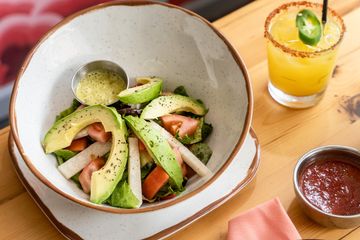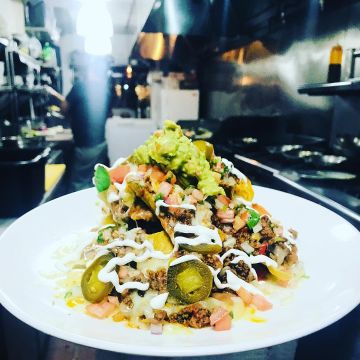Discover the essence of mexican food through traditional recipes
Wiki Article
Is Mexican Food Healthy? Unpacking the Nutritional Conveniences of Traditional Active Ingredients
The question of whether Mexican food is healthy and balanced welcomes an exploration of its traditional ingredients. Beans and corn function as fundamental staples, rich in healthy protein and fiber. Avocados provide advantageous fats, while various natural herbs and seasonings include taste and wellness advantages - mexican food. Together, these parts develop a tapestry of nourishment. However, the healthfulness of Mexican cuisine frequently relies on prep work techniques and part dimensions. What role do these elements play in identifying its general dietary value?The Power of Beans: Healthy Protein and Fiber-Rich Staples
Although typically forgotten, beans function as a foundation of Mexican cuisine, supplying a wealth of dietary benefits. Rich in healthy protein, they are an exceptional plant-based choice for those looking for to meet their nutritional protein needs. This high healthy protein material sustains muscle repair service and development, making beans very useful for both vegetarians and meat-eaters alike. In addition, beans are an outstanding source of dietary fiber, which aids in food digestion and promotes a sensation of volume, possibly assisting with weight management.The variety of beans made use of in Mexican meals, such as black beans, pinto beans, and kidney beans, adds to a varied taste profile and can improve meals nutritionally. Moreover, beans are low in fat and include crucial vitamins and minerals, consisting of magnesium, iron, and folate. Together, these characteristics make beans an important component, providing both nourishment and sustenance in conventional Mexican fare.

Corn: a Versatile Grain With Nutritional Conveniences
Corn stands apart as a versatile grain essential to Mexican cuisine, celebrated not only for its cooking applications yet also for its remarkable nutritional profile. As a primary ingredient in meals like tortillas, tamales, and pozole, corn gives necessary nutrients that add to a well balanced diet regimen. Rich in carbohydrates, it offers as a substantial energy source, while additionally being low in fat, making it a beneficial choice for different nutritional needs.Additionally, corn is a good source of nutritional fiber, which helps in digestion and advertises satiation. It contains substantial quantities of vitamins such as B-complex vitamins, which are important for basal metabolism. The existence of antioxidants, specifically carotenoids, adds to general health and wellness by reducing oxidative tension. Additionally, corn is gluten-free, accommodating those with gluten level of sensitivities. In general, the dietary advantages of corn underscore its importance in traditional Mexican food and its function in a healthy diet regimen.
Avocados: Healthy And Balanced Fats and Nutrients in Every Bite
Avocados play a considerable role in Mexican cuisine, enhancing meals with their luscious structure and rich flavor. Beyond their culinary charm, avocados are commemorated for their outstanding nutritional profile. They are a rich source of healthy and balanced monounsaturated fats, which can help reduced bad cholesterol degrees and assistance heart wellness. Additionally, avocados are loaded with vital vitamins and minerals, including potassium, vitamin E, and B vitamins, adding to overall wellness.The high fiber web content in avocados help food digestion and advertises satiety, making them a useful enhancement to any kind of dish. Their distinct nutrient make-up can additionally sustain skin health and wellness and offer anti-inflammatory benefits. Including avocados right into standard Mexican dishes or appreciating them as a standalone treat can enhance both taste and nutrition, demonstrating why they are a cherished staple in Mexican food. In general, avocados use a delicious method to take pleasure in healthy fats and important nutrients in every bite.

Flavors and Herbs: Flavorful Wellness Boosters
While taking pleasure in the view it now rich tastes of Mexican cuisine, one can not overlook the vital function that spices and natural herbs play in enhancing both taste and health. Ingredients such as oregano, chili, and cilantro peppers not only contribute to the vibrant flavor profile however additionally give substantial wellness advantages. As an example, cilantro is recognized for its cleansing residential properties, assisting to get rid of heavy metals from the body, while oregano is packed with antioxidants and possesses anti-inflammatory results.Chili peppers, a staple in numerous Mexican meals, contain capsaicin, which has actually been connected to improved metabolic rate and pain relief. In addition, flavors like cumin and coriander assistance digestion and may aid in blood sugar regulation. Including these flavorful wellness boosters into dishes not just improves the culinary experience but also promotes total health, making Mexican food not just tasty, but also nutritionally advantageous.
Traditional Food Preparation Techniques: Enhancing Nourishment and Taste
Traditional food preparation techniques in Mexican food play an important duty in improving both nutrition and taste, as they commonly prioritize fresh components and time-honored strategies. Methods such as nixtamalization, where corn is saturated and prepared in an alkaline option, not just improve the nutrient profile of tortillas but next page also boost their digestibility - freshly made guacamole. Furthermore, using slow-moving food preparation approaches, like stewing or braising, enables flavors to combine perfectly while retaining the stability of the components
Frequently Asked Concerns
Are Mexican Food Portions Typically Larger Than Other Cuisines?
Mexican food sections are frequently bigger than those of numerous various other cuisines. This characteristic mirrors typical dining techniques, highlighting public sharing and hearty dishes, which can result in a much more significant offering size overall.
Exactly how Does the Preparation Method Affect Healthfulness of Mexican Food?
Prep work methods greatly affect the healthiness of Mexican food. Methods such as barbecuing or steaming maintain nutrients, while frying can increase unhealthy fat material. Selections of components and cooking designs inevitably figure out total nutritional worth.Can Mexican Food Be Tailored for Details Dietary Limitations?
Mexican food can certainly be tailored for particular nutritional constraints. Alternatives, such as using corn tortillas for asian cuisine gluten-free diets or integrating more vegetables, enable individuals to appreciate standard flavors while accommodating numerous dietary needs.What Prevail Misconceptions Regarding Mexican Food and Health And Wellness?
Usual misconceptions regarding Mexican food consist of the belief that it is naturally undesirable, extremely spicy, and solely focused on fats. In reality, standard recipes typically include healthy active ingredients and can be tailored to various nutritional demands.Are There Much Healthier Choices at Mexican Dining Establishments?
Much healthier alternatives at Mexican dining establishments frequently include barbequed meats, beans, and fresh vegetables. Selecting recipes that emphasize entire components and avoiding heavy sauces can bring about a more healthy eating experience, promoting overall health.The range of beans made use of in Mexican recipes, such as black beans, pinto beans, and kidney beans, contributes to a varied flavor account and can improve meals nutritionally. Avocados play a considerable function in Mexican cuisine, complementing dishes with their velvety texture and abundant taste. Incorporating avocados right into standard Mexican meals or enjoying them as a standalone treat can boost both taste and nourishment, demonstrating why they are a cherished staple in Mexican food. While enjoying the rich flavors of Mexican food, one can not overlook the crucial role that spices and natural herbs play in boosting both taste and health and wellness. Typical food preparation techniques in Mexican cuisine play an essential role in enhancing both nourishment and flavor, as they typically focus on fresh ingredients and time-honored methods.
Report this wiki page